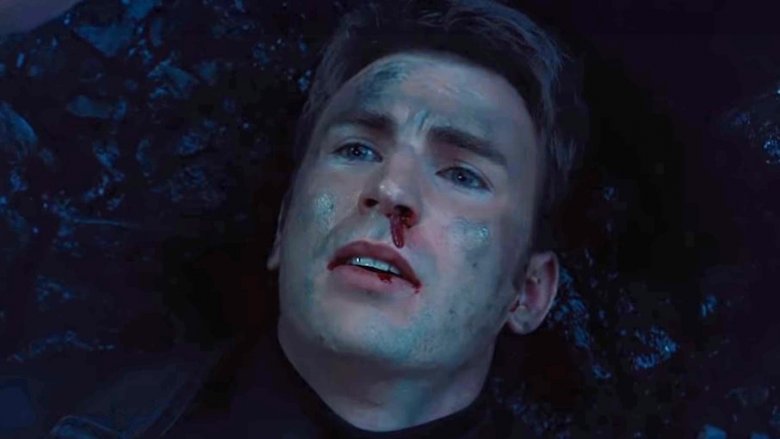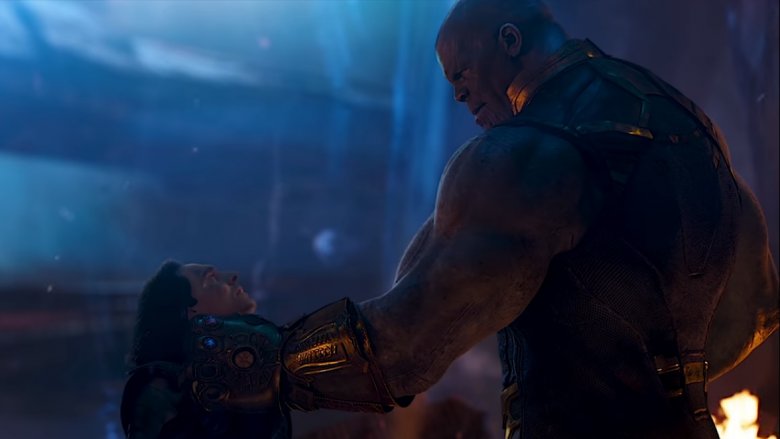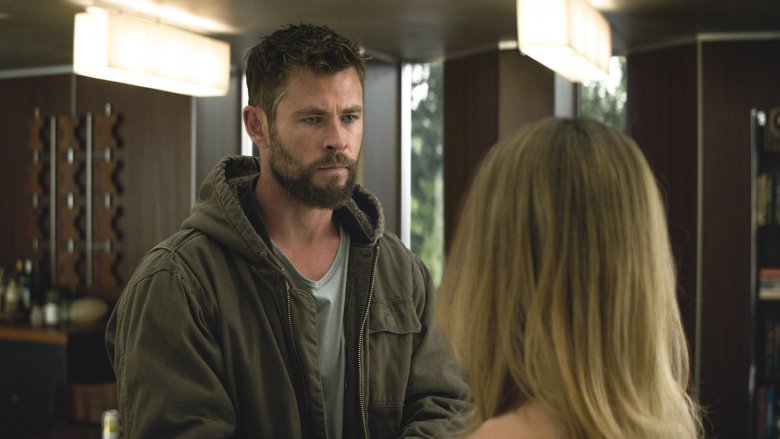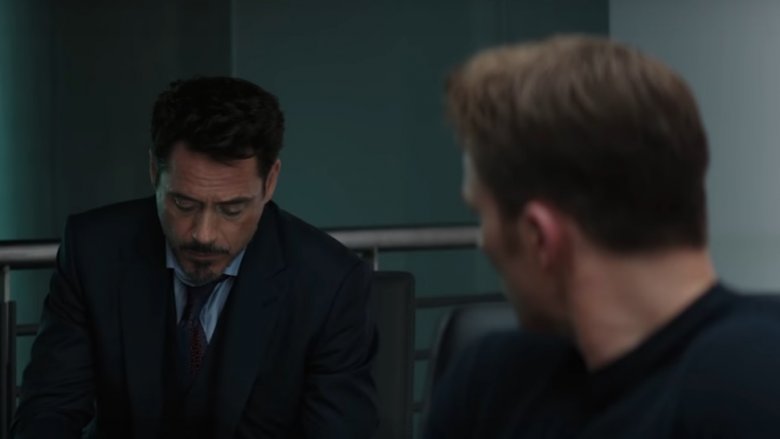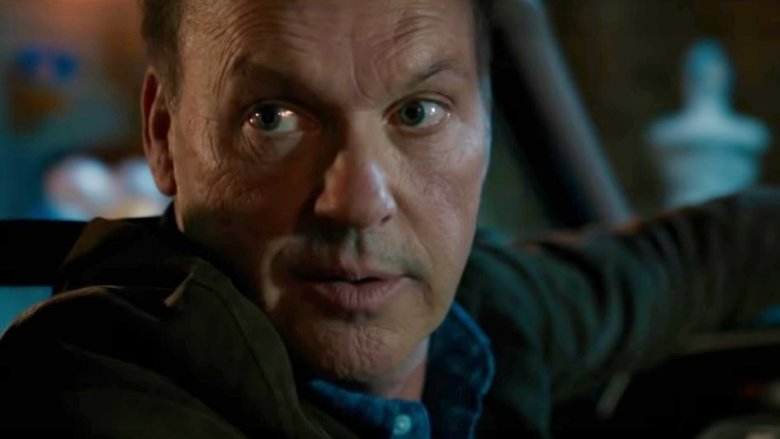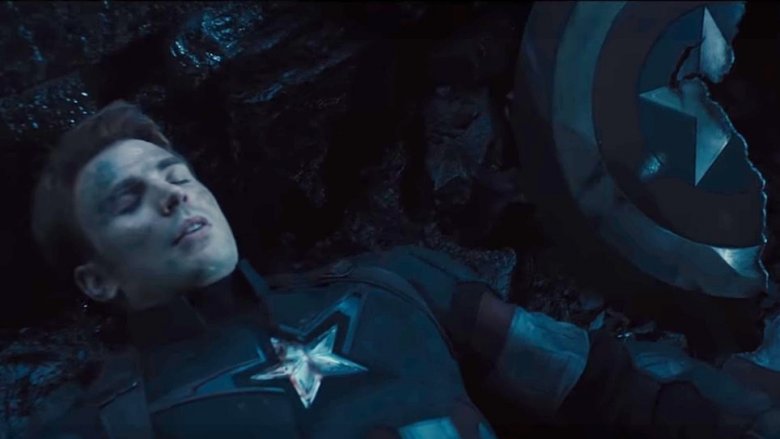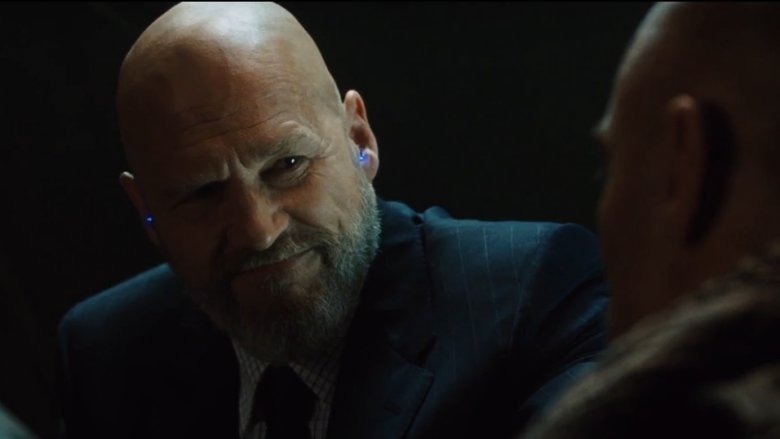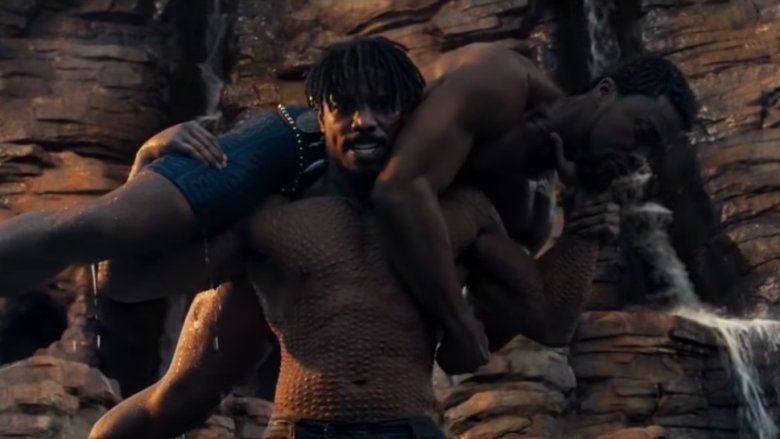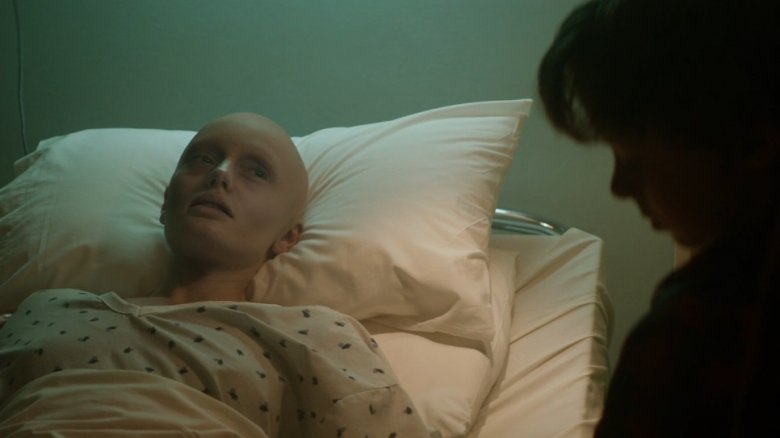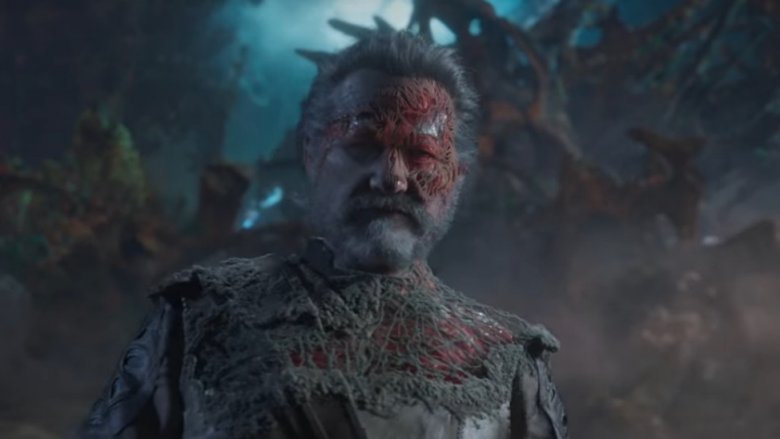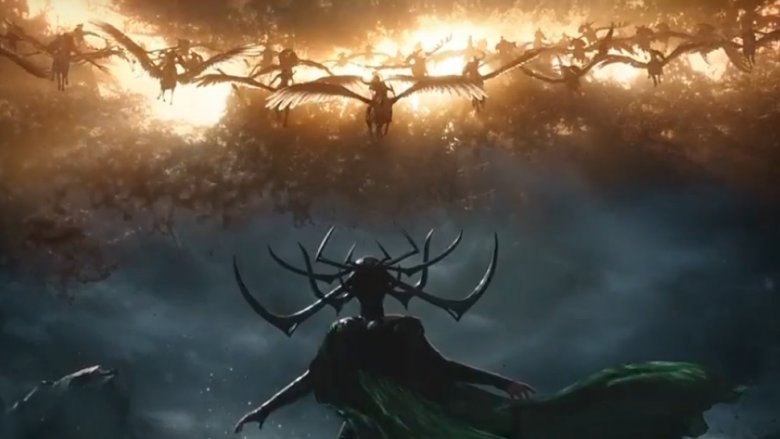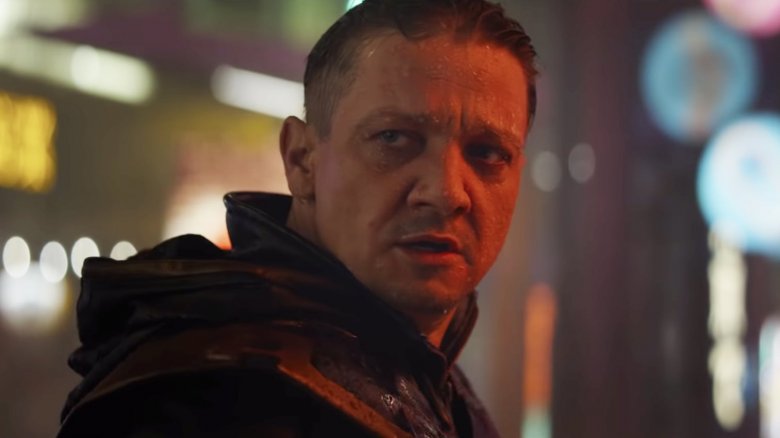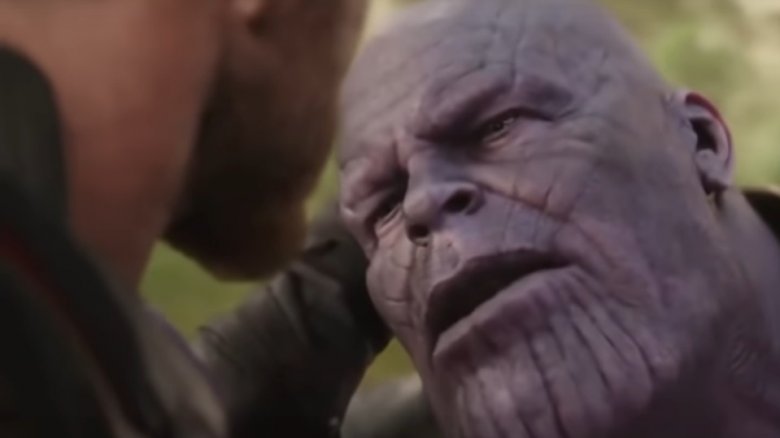The Darkest Marvel Movie Moments
Fans of the Marvel Cinematic Universe generally know what to expect when they go to catch the latest offering: They're going to get the heck entertained right out of them. In stark (!) contrast to the dark 'n' gritty tone established by Christopher Nolan's Batman trilogy and favored by rival studio Warner Brothers' DC movies (at least in their earlier entries), Marvel movies — even the ones that deal with such weighty themes as post-traumatic stress disorder (Iron Man 3) and civil wars (um ... whichever one that was) are straight-up fun. Did you see Thor: Ragnarok? What a candy-colored, wise-cracking, Led Zeppelin-ing blast of joy! Which happened to feature the Goddess of Death slaughtering hundreds of people!
Marvel Studios tends to sneak in some pretty damn dark material in between all the one-liners and amazing action setpieces. It's a delicate balance, but Marvel head honcho Kevin Feige seems to have an eagle eye for filmmakers who are adept at pulling it off — filmmakers like James Gunn, whose first superhero flick, a little lark called Super, manages to split your sides with laughter while featuring a protagonist who beats dudes half to death with a wrench. Here are the times the MCU got really, really real — the darkest moments in Marvel movies.
Loki's last stand
We all knew that Avengers: Infinity War was going to mess with our emotions. We knew that the genocidal Thanos was going to get center stage, that he was on a mission to wipe out half of all life in the universe, and that there would be blood. The trailers teased us, leading us to believe that either Iron Man or Captain America was almost certainly going to bite the dust (although neither of them did), and we were all prepared for the most straightforwardly grim experience the MCU had offered us thus far. What no one could have prepared for, at all, was the film's brutal opening scene.
As the survivors of the destruction of Asgard were cruising through space on their way to their new home on Earth, the trip was interrupted by Thanos, who had an inkling that the Space Stone just might be aboard. He was right; it was, of course, in the possession of Loki. After Thanos made it clear he wasn't screwing around by impaling Heimdall, Loki attempted to pull some of his signature trickery by offering up the stone — and then attempting to stab Thanos in the throat. It didn't work. The Big Purple Bad then seized the beloved trickster god, who had endeared himself to audiences for the last seven years, and just snapped his freaking neck, dumping his lifeless body on the ground in front of Thor with a snarky "no resurrections this time." Cold blooded.
Thor's revenge
Thor warned Grimace — er, Thanos — that he would die for the murder of Loki, but he famously failed to follow through at the end of Infinity War by not going for the head. As Avengers: Endgame opened, the surviving Avengers (along with Captain Marvel) were able to track the Mad Titan down like a dirty dog to his lonely farm planet, intending to steal back the Infinity Stones so that they could reverse his half-of-all-life-destroying Snap. Unfortunately, upon their arrival, Thanos revealed that he had basically set the stones to self-destruct (nearly killing himself in the process), as he figured that his genocidin' job was done.
This obviously didn't sit well with anyone, least of all Thor, who had quite obviously — and, you know, kind of rightly — held himself responsible for fumbling the Snap. As the news of the stones' destruction settled in (and Rocket came across the burnt-out Infinity Gauntlet, confirming the worst), Thanos started to deliver what undoubtedly would've been some long-winded speech to his "daughter" Nebula, had he not been interrupted by a Stormbreaker to the face, courtesy of Thor. "What did you do?!" blurted Rocket, apparently not seeing Thanos' enormous cranium rolling around on the floor right in front of him. "I went for the head," replied the Thunder God, with a lack of humor. And that, dear reader, is how we got one of the MCU's only decapitations.
Tony Stark gets way too real
One of the more intense moments in Captain America: Civil War came after Tony Stark's B.A.R.F. presentation. Stark was cornered while waiting for an elevator by a woman named Miriam (Alfre Woodard), the mother of a young man who was killed during the Avengers' battle with Ultron in Sokovia. The nature of their conversation was such that Stark briefly misread it as an assassination attempt — and later, after the Avengers were presented with the Sokovia Accords by "Thunderbolt" Ross, we saw that it stuck with him in a major way.
As team members were debating their response to the accords, Steve Rogers noted that Stark's uncharacteristic silence likely meant he had already made up his mind — and boy, was he right. After cracking a few uneasy jokes while calling up a photo of a young man, Stark said, "Oh, that's Charles Spencer, by the way. He's a great kid. Computer engineering degree. 3.6 GPA. Had a floor-level gig. ... He decided to spend his summer building sustainable housing for the poor. Guess where? Sokovia. He wanted to make a difference, I suppose. I mean, we won't know because we dropped a building on him while we were kicking ass." These last two words were delivered with an immovable contempt that would soon collide with Cap's unstoppable ideals, and Stark's jaw-dropping speech convinced half the team in that one moment.
The Dad Talk
It sucks to find out that the father of your crush and date for the big dance is a supervillain who sells alien weapons to the highest, slimiest bidder, and it sucks even more when said date casually blabs key details of your activities that clue dear old Dad in to the fact that you're the web-slinging hero who has been a huge pain in his rear end for the last couple weeks. When Adrian Toomes sent his daughter, Liz, on in to the dance so he could give Peter Parker the "Dad talk" in Spider-Man: Homecoming, we had an idea what was coming — but oooooooof.
"Peter, nothing is more important than family," Toomes said. "You saved my daughter's life ... so I'm gonna give you one chance. Are you ready? Walk through those doors, you forget any of this happened. And don't you ever ... ever ... interfere with my business again." Then, displaying his understanding of just how important family really is, Toomes went for the throat. "'Cause if you do," he said, "I'll kill you. And everybody you love. I'll kill you dead. That's what I'll do to protect my family, Pete. Do you understand?" He then forces the skinny teen to thank him for saving his life, which probably gave a whole legion of unbalanced dads new material for prom night.
Wanda blows Stark's mind
Considering that it's a film that features the near-annihilation of the human race at the steely hands of a killer artificial intelligence, it's a bit odd that the darkest moment in Avengers: Age of Ultron comes before we've even seen the opening title card. During the team's successful raid of a HYDRA compound where Loki's scepter (and the Mind Stone within it) were being kept, they got a sneaky surprise from Pietro and Wanda Maximoff, the twins enhanced by HYDRA's experimentation. As Pietro knocked around Hawkeye and Cap, Wanda discovered Tony Stark, who had infiltrated the conquered compound and had eyes on the scepter. She used her power to induce in him a really disturbing vision.
Stark saw the Earth decimated, the Hulk struggling for life — and Thor and Black Widow dead as doorknobs. Captain America's shield lay busted in half with Cap unconscious nearby, and as Stark went to check his pulse, he awakened and uttered words that would haunt Stark for the rest of his life: "You could have saved us." Then, he freakin' died, but his voice continued to implore, "Why didn't you do more?" Stark soon snapped out of it and seized the scepter, but years later, this incident would doubtless inform the most critical decision he would ever make: to sacrifice himself by using the Infinity Stones to wipe out Thanos and his army at the climax of Endgame.
Never trust an Iron Monger
The very first MCU flick, Iron Man, pulled a neat trick in the slow reveal of its true villain. It was established early on that Howard Stark was no longer around, that Tony was having kind of a tough time shouldering his legacy, and that Obadiah Stane had sort of stepped into the role of mentor and father figure for Tony. Plus, he was played by Jeff Bridges! The Dude, for crying out loud! How could the Dude turn out to be the evil one in a movie where terrorists were forcing people to build weapons of mass destruction under threat of death and attempting the wanton slaughter of civilians? But oh, Stane was indeed an evil Dude — enough so that even the head terrorist, Raza, paid with his life for trusting the bastard.
On a fact-finding mission to the Middle East, Stane was presented with the remains of Stark's Mark I armor by Raza, who hoped he would be repaid "with a gift of iron soldiers." Perhaps their common baldness lulled Raza into a false sense of security because he totally failed to see the double-cross coming. Stane incapacitated him before having his men snatch the armor and just murder everybody — our first major indication that not only were his intentions less than noble, they were downright dastardly. The lesson here: Never trust a bald guy.
They don't call him Killmonger for nothing
Erik "Killmonger" Stevens was among the MCU's greatest villains due to his interesting and complex motivations and host of relatable human qualities. Mercy, however, was not one of those qualities. In Black Panther, when he challenged his cousin T'Challa for the throne and the title, we were expecting a knock-down, drag-out brawl; we just weren't expecting "chuck-to-certain-doom-over-cliff" to be added to that descriptor.
Although T'Challa proved formidable even stripped of the powers afforded him by the Heart-Shaped Herb, it seems like Killmonger simply wanted it more. After beating the ever-loving snot out of his relative as if it were an hour after dinner on Thanksgiving, the man upon whom the notoriously badass Navy SEALS bestowed the nickname "Killmonger" showed us all why he deserved that title. He hoisted T'Challa over his shoulders, and — in front of the king's friends, family, countrymen, and presumably the spirits of his ancestors — flung him over the edge of a cliff to the rocky riverbed below. Although he survived — barely — we'll never be able to unsee the look on poor Shuri's face when her beloved brother got the ultimate heave-ho.
Nothing tougher than losing a parent
They said that a weird, space opera-esque film featuring a super-ripped Chris Pratt, a talking raccoon, and a sentient tree could never work, for some reason. They said that Marvel had finally bitten off more than it could chew, and that Guardians of the Galaxy was destined to be the studio's first flop. Instead, the 2014 film became nothing short of Star Wars for a new generation — and, more so than any previous MCU effort, it was just a heaping helping of fun, with some genuinely emotional moments tossed in for good measure. Of course, one of those emotions is wrenching anguish because Guardians is the happiest, goofiest film to ever begin with a woman painfully dying of cancer right in front of her young son.
The flick's opening goes a long way toward establishing the deep sadness underneath the cocky, wisecracking exterior of Peter Quill/Star-Lord, and it also went a long way toward making us wonder if we had wandered into the wrong theater. It was certainly a bold narrative choice, and it paid off in the film's climax, when Quill has a vision of his dying Mom while grasping the Power Stone (a scene which just jerked all of the tears). But after the absolutely brutal opening, it's kind of a wonder that anyone stuck around for all the fun.
When you find out your dad killed your mom
When it comes to family, Peter Quill just cannot catch a break. His surrogate father figure, Yondu, spent most of his appearances in Guardians reminding Quill that, after scooping him up from Earth the night of his mother's death, he had been this close to literally feeding the young boy to his buddies. In the flick's 2017 sequel Guardians of the Galaxy, Vol. 2, it looked like Quill might finally find true family by way of Ego, the Celestial and "Living Planet" who had come down to Terra to have a fling with Quill's mother. But as his Dad was in the middle of infusing him with the power of the Celestials, he casually dropped a ridiculous hurt-bomb.
"I returned to Earth to see her three times," he said. "I knew if I returned a fourth, I'd never leave ... so I did what I had to do. But it broke my heart to put that tumor in her head." Just ... ugh. Of course, this sent Quill into a blind rage, and with the help of the Guardians he was able to defeat the cancer-causing planet. His heart was then healed a bit by Yondu, who turned out to be a big ol' softie when he delivered the iconic line, "He may have been your father, boy, but he wasn't your Daddy!" Then Yondu was promptly killed. Seriously ... can't catch a break.
Taking on goddess of death yields predictable result
Thor: Ragnarok was a giant blast of fun, full of hilarious quips, one-liners, and sight gags. But it also features as its primary antagonist Hela, the Goddess of Death, and she does her thing a lot. That scene in which she just shows up and takes out Asgard's entire army would certainly have been worth discussing if not for the nostalgic musings of Valkyrie — who, in a flashback, revealed that time she was the lone survivor of a "battle" that was somehow even more messed up.
See, it was a "battle" because it wasn't so much a real battle as it was the wanton slaughter of the Valkyries, Asgard's elite all-female fighting force, whom Hela mowed down as if they were cardboard cutouts. It's an epic scene, and it makes Valkyrie's reluctance to stand in Hela's way perfectly understandable — but, holy crap. For such a Phun and Phuncky Phlick, you'd think one scene depicting a horrifying massacre would have been enough.
Hawkeye no more
The opening scene of Avengers: Endgame is a total gut-punch in its own right, as Clint Barton (aka Hawkeye) is enjoying some well-deserved down time with his family, only to suddenly discover that, gee whiz, he no longer has a family. Every one of them was dusted by Thanos, and as the scene cuts away, we know that Barton is just seconds from cinematically screaming "NOOOOOO!" to the heavens. But the next time we see him, it's even more gut-punchy because Barton is simply gone, replaced by a man with a bottomless sadness in his eyes and no interest in anything other than dealing as much death as he possibly can.
As Barton was wrapping up annihilating a whole squad of Japanese mobsters, Natasha Romanoff showed up to let him know that, hey, the Avengers had a plan that just might reverse the damage Thanos had done. At her words, Barton — who, again, had just finished killing seriously so many people — began to openly weep. "Don't do that," he said. "Don't give me hope." We all know that Barton has seen and done a lot of crazy things, but we don't know that anyone ever expected ol' Arrow Fingers to go this dark.
The snap felt 'round the universe
If ever in the future there is a darker MCU moment than the Decimation and its aftermath, probably no one wants to see it. It's burned into the brains of every Marvel fan: the look on Thor's face when he realized he'd blown it. Steve Rogers, kneeling over the pile of ashes that used to be his best friend. Okoye, watching her brave and noble king turning to dust. Young Peter Parker, falling into the arms of Tony Stark and ... okay, just no. Sure, everyone was revived by Bruce Banner in Endgame, and we still don't want to think about that.
But the real darkest part, literally and figuratively, is when we saw Thanos basking in his victory on that farm planet of his, and then ... cut to black. That's all, folks, movie's over. No Marvel fan will ever forget that sick, sinking feeling upon realizing that, yes, this is how this movie ends. It would be an entire freaking year before we got catharsis, before all those beloved heroes would be brought back and our fanboy and fangirl hearts could be healed. It was the single most traumatizing thing Marvel Studios ever did to us, but as long as they keep the awesome movies coming, perhaps we can learn to forgive in time.
